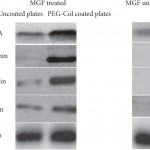Prospective randomized double-blind multicenter phase II study comparing chemotherapy with gemcitabine and cisplatin plus sorafenib vs gemcitabine and cisplatin plus placebo in locally advanced and/or metastasized urothelial cancer – SUSE – (AUO-AB 31/05)
Sir,
Krege et al. [1] report on the results of adding sorafenib to standard cisplatin and gemcitabine (CG) in first-line advanced urothelial cancer. Despite reporting on negative findings overall, the results should be discussed because of two major issues.
Firstly, investigators are now asked to delineate the mechanisms behind the clinical benefit of specific targeted compounds, otherwise the probability of succeeding in identifying their add-on effect over what can be expected by standard therapy alone will continue to be a matter of chance rather than the result of a structured methodology. The history of sorafenib in non-small cell lung cancer, where the early clinical benefit was observed in selected patients only, and was lost in a Phase III trial where it was added to CG, is paradigmatic [2]. In bladder cancer, despite two negative Phase II trials added to the present study in a metastatic setting, early signals of positive effects on the rate of pathologic complete responses in combination with CG were recently reported by our group in an ongoing Phase II trial in the neoadjuvant setting for muscle-invasive, node-negative disease (NCT01222676) [3-5]. Although caution is needed and the incongruity might be attributable to the small numbers, this might reflect underlying biological discrepancies between early and advanced disease, as the landscape of molecular alterations in the respective settings is still unrecognized. This is the reason why resources would be best spent fostering the identification of the molecular landscape associated with either response or resistance to the drug, and in different clinical settings. With this aim, a Worldwide Innovative Networking (WIN)-supported project will be conducted as a joint venture between Fondazione IRCCS Istituto Nazionale dei Tumori (INT), Milan and Memorial Sloan-Kettering Cancer Center (MSKCC). In this project, whole exome sequencing will be used to genomically characterize responders as well as primary progressors identified in sequential INT-sponsored Phase II trials, including the sorafenib plus chemotherapy one. A similar design should be pursued for all cases with available tissue enrolled in the three sorafenib trials reported in urothelial cancer.
Secondly, authors highlight the methodological constraints leading to delay, redundancy, premature closure, and characterizing most of the Phase II trials in bladder cancer, a disease already subject to heavy scrutiny for slow activation and completion of trials over the past and recent years. Dramatic changes are needed in the way we structure support for multicenter, randomized trials in this difficult disease. This would imply reconsidering the concepts of patient molecular characterization, eligibility for trials with targeted agents, harmonizing the relationship between academia and the pharmaceutical companies, utilizing adequate methodological assumptions in the framework of genomically informed clinical trials. From a European perspective, these tasks have been put on the agenda of the Genitourinary Cancers Group of the European Organization for the Research and Treatment of Cancer (EORTC). All these efforts are fostered by the aim to revitalize informed and affordable clinical trials in the area of bladder cancer research.
A. Necchi*, P. Giannatempo*, E. Farè*, D. Raggi* N. Nicolai†, M. Maffezzini† and R. Salvioni†
Department of *Medical Oncology and †Surgery-Urology Unit, Fondazione IRCCS Istituto Nazionale dei Tumori, Milan, Italy
Corresponding author:
Andrea Necchi, MD
Department of Medical Oncology
Fondazione IRCCS Istituto Nazionale dei Tumori, Milan, Italy
Via G. Venezian 1, 20133 Milan, Italy
Tel. +39-02-2390-2402; Fax. +39-02-2390-3150
Email. andrea.necchi@istitutotumori.mi.it
References
- Krege S, Rexer H, Vom Dorp F et al. Prospective randomized double-blind multicenter phase II study comparing chemotherapy with gemcitabine and cisplatin plus sorafenib vs gemcitabine and cisplatin plus placebo in locally advanced and/or metastasized urothelial cancer – SUSE – (AUO-AB 31/05). BJU Int 2013; epub ahead of print, doi: 10.1111/bju.12437.
- Paz-Ares LG, Biesma B, Heigener D et al. Phase III, randomized, double-blind, placebo-controlled trial of gemcitabine/cisplatin alone or with sorafenib for the first-line treatment of advanced, nonsquamous non–small-cell lung cancer. J Clin Oncol 2012; 30: 3084-92.
- Dreicer R, Li H, Stein M et al. Phase 2 trial of sorafenib in patients with advanced urothelial cancer: a trial of the Eastern Cooperative Oncology Group. Cancer 2009; 115: 4090-5.
- Sridhar SS, Winquist E, Eisen A et al. A phase II trial of sorafenib in first-line metastatic urothelial cancer: a study of the PMH Phase II Consortium. Invest New Drugs 2011; 29: 1045-49.
- Necchi A, Fina E, Giannatempo P et al. Early results of a phase 2 study of neoadjuvant cisplatin and gemcitabine plus sorafenib (S-CG) for patients with muscle-invasive transitional cell carcinoma of the bladder (INT52/10, NCT01222676). European Cancer Congress 2013 (abstr. 2751).


